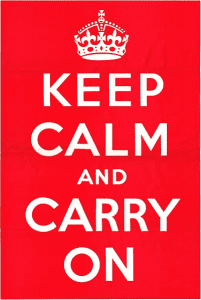 Keep calm. Carry on.
Keep calm. Carry on.
Be careful about words and how they can roil us.
I once saw a group of academics start to get very heated over the word postmodern until someone realized that the artists and the philosophers did not have a shared definition of the same term. They were both correct in concerns about the other if both had been using the same word in the same way.
Beware “science” words imported into other fields. An unfortunate number of people thought the “theory of relativity” in science said something about ethical relativity: same word, wildly different usages in the context of the experts in field.
A “pandemic” of a virus would not be good news, but my social media feed is full of unhinged reactions. The word “pandemic” is confusing people as are a great many non-experts getting clicks by opining. A flu-like illness is not the “zombie apocalypse” and this is not a sign the end is nigh or so say the relevant experts.
I am not any kind of expert on the science. Go read them, but beforehand let’s talk about how to “hear” scientists.
Philosophers do work on forming clear definitions of words in context. On that front, I can offer a caution: science-speak is not average-person speak. Find out what the experts mean and ask what they are doing for their own families.
Ask yourself: what is the real risk to my friends and family? What is the worst case and how likely is it? Take a hard look at risk and probability (a field philosophers do think about!): Actions to slow down the spread of this virus might disrupt our normal lives, but if you drove on major highways today you took a risk that was relatively substantial without panic. We do dangerous things all the time.
Experts (I am not one) might experience very widespread COVID-19 coronavirus. The death rate is at worse 2% and almost surely lower since (experts tell us), mild cases probably do not get diagnosed, and so are not included in the statistic. If in a high risk group (as defined by scientists), take the advice these experts give you.
As someone who has studied how science works (philosophy of science), I can comment on what those of us who do not do science should know and do when a situation like this occurs (medical scientists are the experts):
- Find experts, start with the Centers for Disease Control, and listen. Realize the government prepares for the worst and we usually get something less.
- When listening to a scientist, recall they may be communicating with words in the “science domain.” Scientists are not always the best at communicating with non-scientists. Example: If a scientist says something is “highly improbable,” do not panic because she just said “there is a chance this terrible thing might happen.” No! She is saying she cannot totally rule it out (that’s almost impossible to do). Scientists cannot rule out most horrible things that could happen to us tomorrow, but are highly improbable. Beware the earnest reporter who has seen too many disaster movies asking if a horrid thing could happen. The honest answer will often be “maybe, probably not.” That’s not a cue to pain. Many, many, many things might happen. We might get hit by a large asteroid. We might all die of a different dread disease. There are many bad things in all our lives that are so much more probable than what a scientist calls “highly improbable.” We should put the risk of the highly improbable out of our minds.
- Take normal precautions recommended by experts. Who are the experts here? Listen to medical doctors, but follow more than one in case you have landed on a lunatic. There are experts on pandemics and they will tell you what to do.
- This is not a movie. The “seeming crank” on social media probably is.
- Wash your hands.
Historically in situations like these, the panic is worse than the problem. Don’t panic. Keep calm. Carry on.
















